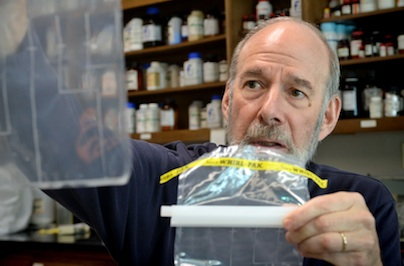Study to examine Ebola’s survival rate, disinfection in sewage
January 13, 2015
One of the effects of contracting the Ebola virus is severe diarrhea, which is literally flushed down the drain. But is this creating a new potential hazard, especially for sewer workers and others who may come in contact with this waste?
The University of North Carolina will attempt to answer this question with a new study titled “RAPID: On-site Disinfection and Survival of Ebola and Other Viruses in Human Fecal Wastes and Sewage.”

Dr. Mark Sobsey demonstrates his award-winning compartment bag water quality test (CBT), a quick and accurate field test for E. coli in drinking water.
Led by Mark D. Sobsey, PhD, Kenan Distinguished Professor in the UNC Gillings School of Global Public Health’s environmental sciences and engineering department, the study is being funded by the National Science Foundation (NSF).
“We really don’t know how long the virus survives in fecal wastes and sewage and how it can best be inactivated or killed by chemical disinfection methods,” Sobsey said. “It is those questions that this project will attempt to answer through this new research.”
The study involves batch laboratory-scale experiments to quantify and characterize the rate and extent of inactivation of a mutant Ebola strain in feces and raw sewage. The mutant Ebola strain will be studied in collaboration with colleagues at the University of Wisconsin who developed it. Samples will be tested at 37° C and a room temperature of approximately 23° C under both aerobic and anaerobic conditions.
The researchers also will determine the rate and extent of inactivation of viruses in feces and raw sewage by batch disinfection with different doses of the disinfectants free chlorine, 2 quaternary ammonium compounds, peracetic acid, lime (calcium hydroxide), a phenolic compound and an anionic detergent.
The study will use a genetically modified Ebola virus strain that is not infectious for humans or animals, as well as surrogate and indicator viruses, to determine the effectiveness of treatments.
“The results of this study will make it possible to design and implement effective onsite management systems and protocols in health care and other settings to reduce the risks of the spread of Ebola virus from people sick with this disease via their feces and sewage,” Sobsey said. “This is especially important for people who work with sewage systems or who come in contact with this waste before it reaches a sewage treatment plant.”
The study will commence in February 2015. Sobsey hopes recommendations based on the results will be available within a year.
Gillings School of Global Public Health contact: David Pesci, director of communications, (919) 962-2600 or dpesci@unc.edu.
